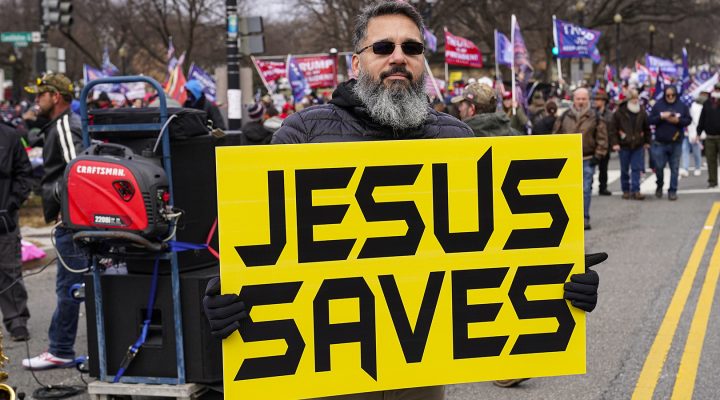Failure to teach Baptist history in Baptist churches has made congregants susceptible to Christian nationalism, according to Baptist historians from two generations.
In Baptist churches today, the history of the movement is rarely mentioned or taught any more, and this has caused a disconnect on what makes a Baptist a Baptist, said Bill Leonard, emeritus dean of Wake Forest School of Divinity and longtime professor of Baptist studies and church history.
“Churches have to say: Who are we and why are we Baptist? What does being Baptist mean? How do we pass on that knowledge?” he said.
Without knowing this history, modern Baptists have been told a different story, especially about the meaning of religious liberty, a Baptist hallmark, Leonard explained. “Southern Baptists, and what we call independent Baptists, the Jerry Falwell crowd, have moved away from this sense of radical religious liberty based on the freedom of conscience toward Christian nationalism.”
“Southern Baptists, and what we call independent Baptists, the Jerry Falwell crowd, have moved away from this sense of radical religious liberty based on the freedom of conscience toward Christian nationalism.”
There are other voices telling a truer historical account of Baptists and religious liberty, including Baptist Joint Committee for Religious Liberty, which “has made opposition to Christian nationalism the primary work they have to do right now, because that Christian nationalism is so strong,” he reported.
Teaching history in a Baptist church is important because of Baptist autonomy and the doctrine of the priesthood of all believers, he continued. “Rightly or wrongly, the great genius of the Baptists is that the people can be trusted to interpret Scripture or write correctly in the context of a believing community under the guidance of the Holy Spirit.”

Bill Leonard
Baptists were some of the earliest advocates for religious liberty, Leonard said. “Not simply for different Christians groups, but for the atheist and the heretic, meaning they said, ‘God alone is judge of conscience, and neither an established church, an official church or a state can dictate to conscience in terms of forcing people to be baptized.’”
Baptists always have believed in the authority of Scripture, but they also have believed in the freedom of people to interpret Scripture, he noted.
Teaching Baptist history in a congregational setting may not be as easy as it sounds, added Andrew Gardner, author of Reimagining Zion: A History of the Alliance of Baptists and a postdoctoral research associate at Baylor University.
One difficulty with defining Baptist history is the diversity within the Baptist movement itself, a movement that spans multiple “Baptist” denominations across changing times.
“There’s really no one monolithic history that Baptists come from,” Gardner explained. “Even if you look at the origins of Baptists in England in the 1600s, you have some that are Arminian, and you have some that are Calvinist. From the very beginning, there’s diversity.”
“Even if you look at the origins of Baptists in England in the 1600s, you have some that are Arminian, and you have some that are Calvinist. From the very beginning, there’s diversity.”
That is inherent in the way the Baptists developed, he and Leonard agreed.
Early Baptists desired to create a purer form of Christianity that gave more freedom to the congregants and returned to the intent of the early church. This deviation from tradition and thousands of years of history that upheld the Catholic Church set the stage for Baptists to lose touch with a swath of Christian history, the historians said.
In this restoration movement and in the Protestant Reformation as well, Baptists and others inadvertently left church history behind, Gardner said. “Written into the DNA of Protestants is this neglect of history and tradition.”
But even the early church had trouble identifying a single strain of history, he added. “When you read 1 Corinthians, Paul says some are following Peter, some Apollos. … There is division from the very beginning.”

Andrew Gardner
“Churches are always contextualized in a particular historical moment,” Gardner said. “The attempt to read into what the early church was, removed from any historical context, as if we could return to that historical context, is a-historicizing Christianity. … That leads to there being no necessity for thinking about how Christianity has developed over time or how a particular denominational tradition has developed over time.”
In addition, when the history of Christianity and the history of the Baptist church is not taught, it is easy for the church to control biblical interpretation, Gardner said.
“It’s much more dangerous to study church history than it is to study the biblical text, because the biblical texts, you have your documents in front of you, and you can interpret them how you will. With history, you have a lot more interpretation of those biblical documents that they don’t really want to deal with.”
For example, “inerrancy” is the common term associated with a literal or fundamentalist reading of the Bible. This interpretation arose partly in response to higher criticism of the Bible in the late 19th century. Thus, “that tradition of inerrancy has not existed for more than 200 years,” he said.
And just like Baptist history, knowing the history of the Bible is essential for all believers, Gardner said, noting it is important to remember the Bible is 66 books, not one singular book of history.
“It is a bunch of stories, some of them are historical, some or not. It was compiled by a bunch of different people. … Even within some of those books, there are different people who are contributing to them.”
Viewing the Bible as an inerrant document leads to the mentality that if you question one part of the Bible, the rest crumbles with it.
However, what makes the biblical texts great is not historical accuracy or a literal reading, Gardner said. “What makes the biblical texts remarkable and very important is that these are stories that have been told for thousands of years. These reflect our thoughts of the divine and continue to reflect our thoughts of the divine.
“That’s pretty remarkable. I can’t think of any other story that humanity has told with that regularity. That’s something that’s profoundly human, profoundly spiritual. It’s how we come together and make sense of our lives and our relationship to God and our relationship to one another.”
Related articles:
Meet the Baptist pastor who helped cultivate the Lost Cause narrative
White supremacists are hell-bent on repeating history | Opinion by Wendell Griffen


